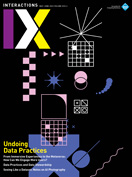Authors:
Janis Wong
Data protection laws and technologies limit the vast personal data collection, processing, and sharing in our digital society. These tools, however, may lack support for protecting individual autonomy over personal data, given the limited recourse individuals have when going up against large, multinational companies. Additionally, existing data stewardship solutions may not facilitate cocreated and collaborative solutions for supporting data protection rights and online safety. To address this, I propose the creation of a data commons for data protection to encourage cocreating data protection solutions and to redistribute power from companies back to individuals and communities. Insights → Data…
You must be a member of SIGCHI, a subscriber to ACM's Digital Library, or an interactions subscriber to read the full text of this article.
GET ACCESS
Join ACM SIGCHIIn addition to all of the professional benefits of being a SIGCHI member, members get full access to interactions online content and receive the print version of the magazine bimonthly.
Subscribe to the ACM Digital Library
Get access to all interactions content online and the entire archive of ACM publications dating back to 1954. (Please check with your institution to see if it already has a subscription.)
Subscribe to interactions
Get full access to interactions online content and receive the print version of the magazine bimonthly.






